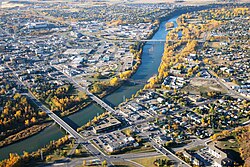| ||
|
| ||
 Distribution of Alberta's 269 urban municipalities as of August 31, 2013 | ||
Alberta has provincial legislation allowing its municipalities to conduct municipal censuses between April 1 and June 30 inclusive.[1][2] Municipalities choose to conduct their own censuses for multiple reasons such as to better inform municipal service planning and provision, to capitalize on per capita based grant funding from higher levels of government, or to simply update their populations since the last federal census.[3]
Alberta had 358 municipalities between April 1 and June 30, 2013,[b] down from 359 during the same three-month period in 2012.[c] At least 40 of these municipalities (11.2%) conducted a municipal census in 2013. Alberta Municipal Affairs recognized those conducted by 38 of these municipalities.[6] By municipal status, it recognized those conducted by 8 of Alberta's 17 cities, 16 of 108 towns, 5 of 94 villages, 1 of 51 summer villages and 8 of 64 municipal districts.[6][d] In addition to those recognized by Municipal Affairs, censuses were conducted by the Town of Swan Hills and the Municipal District of Greenview No. 16.[7][8]
Some municipalities achieved population milestones as a result of their 2013 censuses. The cities of Lethbridge and Lloydminster surpassed the 90,000 and the 30,000 marks respectively. Furthermore, the Alberta and Saskatchewan portions of Lloydminster exceeded the 20,000 and 10,000 milestones respectively as well. Okotoks, Alberta's largest town, surpassed 25,000 residents, while the Town of Whitecourt became eligible for city status by eclipsing 10,000 people. The Town of Blackfalds and the Municipal District of Taber each surpassed the 7,000-mark and the Town of Wainwright grew beyond 6,000.
Cite error: There are <ref group=lower-alpha> tags or {{efn}} templates on this page, but the references will not show without a {{reflist|group=lower-alpha}} template or {{notelist}} template (see the help page).
- ^ "Municipal Government Act: Revised Statutes of Alberta 2000 Chapter M-26 (Office Consolidation)". Alberta Queen's Printer. November 24, 2010. Retrieved June 24, 2013.
- ^ "Municipal Government Act: Determination of Population Regulation, Alberta Regulation 63/2001 (Office Consolidation)" (PDF) (PDF). Alberta Queen's Printer. 2013. p. 3. Archived from the original (PDF) on March 26, 2013. Retrieved December 30, 2013.
- ^ Municipal Census Manual: Requirements and Guidelines for Conducting a Municipal Census (PDF) (PDF). Alberta Municipal Affairs. January 2013. p. 7. ISBN 978-1-4601-0359-3. Archived from the original (PDF) on May 1, 2013. Retrieved June 24, 2013.
- ^ "O.C. 250/2013". Alberta Queen's Printer. August 13, 2013. Retrieved December 31, 2013.
- ^ "Order in Council (O.C.) 328/2012". Province of Alberta. October 17, 2012. Retrieved December 31, 2013.
- ^ a b c 2013 Municipal Affairs Population List (PDF) (PDF). Alberta Municipal Affairs. November 20, 2013. ISBN 978-1-4601-1418-6. Retrieved December 4, 2013.
- ^ "Regular Council Meeting Minutes" (PDF) (PDF). Town of Swan Hills. September 11, 2013. p. 1. Retrieved December 5, 2013.
- ^ "2013 Census Newsletter" (PDF) (PDF). Municipal District of Greenview No. 16. Archived from the original (PDF) on December 15, 2013. Retrieved December 4, 2013.

